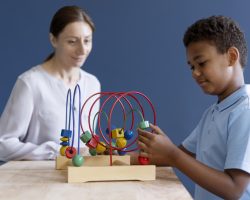What You Can’t See Can Hurt

The Hidden Struggles of NVLDers
Challenges of Nonverbal Learning Disorder :Nonverbal Learning Disorder (NVLD) often goes unnoticed because individuals with NVLD typically exhibit exceptional verbal communication skills. However, their struggles with nonverbal communication—such as body language, facial expressions, gestures, and tone of voice—can lead to significant misunderstandings, especially in interactions with neurotypical individuals. This discrepancy lays the groundwork for various challenges, including mental health issues, workplace stress, and even physical health concerns.
Misunderstandings and Mislabeling
The term “nonverbal” can be misleading, suggesting that individuals with NVLD lack the ability to communicate verbally. On the contrary, many NVLDers possess extensive vocabularies and strong expressive language skills. Challenges of Nonverbal Learning Disorder reality is that their difficulties with day-to-day functioning can be inconceivable to others. Many NVLDers feel like the “walking wounded,” often slipping through the cracks of support systems, leading to pain and rejection despite their parents’ best efforts to help.
The emotional toll on both NVLDers and their families can be profound, resulting in increased stress, anxiety, and depression. Many children with NVLD continue to live at home as adults, struggling to gain independence and requiring ongoing support.
The Prevalence of NVLD
Despite the significant challenges faced by NVLDers, many remain undiagnosed. According to a study published in the April 2020 issue of the Journal of the American Medical Association (JAMA), an estimated 2.2 to 2.9 million children in North America may have NVLD. The overlap of symptoms with other disorders, such as ADHD and autism, often leads to misdiagnosis.
Professionals frequently overlook NVLD due to its exclusion from the Diagnostic and Statistical Manual of Mental Disorders (DSM). This lack of recognition complicates the ability to secure necessary educational services and insurance reimbursement, leaving many individuals without the support they desperately need.
The Need for Understanding and Acceptance
Just as society accommodates individuals with physical disabilities, it’s essential to foster understanding for those with NVLD. There is no visible indicator, like a wheelchair, to signal the challenges faced by NVLDers. As a result, their social awkwardness can lead to judgments of laziness or lack of motivation, exacerbating their struggles with depression, anxiety, and feelings of inadequacy.
These challenges can create a cycle of learned helplessness, broken relationships, and ongoing therapy with little to no results. Many NVLDers begin to question their sanity and self-worth, wondering why they are consistently underestimated.
The Path Forward
In my book, Misnamed, Misdiagnosed, Misunderstood, I delve deeper into these issues, shedding light on the hidden challenges faced by a Challenges of Nonverbal Learning Disorder NVLDers and offering insights for those affected. If you believe you or a loved one may have Nonverbal Learning Disorder, I invite you to explore the strategies for success I discuss in the book.
A Call for Awareness
As a society, we must work towards greater awareness and acceptance of neurodiversity. Understanding that neurological differences are not flaws but natural variations can significantly impact the lives of those with NVLD. By fostering inclusive environments and implementing appropriate accommodations, we can help neurodiverse individuals thrive alongside their neurotypical peers.
Conclusion
The journey for NVLDers is often fraught with obstacles, but with greater understanding and support, we can bridge the communication gap and create a more inclusive world. Let’s work together to celebrate and support the diverse ways in which we think, learn, and communicate.
About the Author
Linda Karanzalis, a Board-Certified Cognitive Specialist, is the author of Misnamed, Misdiagnosed, Misunderstood, a comprehensive exploration of Nonverbal Learning Disorder and other brain-based challenges. Dr. Ned Hallowell, a renowned expert on ADHD, praises Linda’s work as “vivid, compelling, and full of heart.” With over 25 years of experience, Linda provides validation, awareness, solutions, and compassion to the millions living with neurodiversity. Discover more about her journey and book at www.lindakaranzalis.com.
Follow Linda Karanzalis through her social media accounts:

Join the NVLD and NeuroDivergent Facebook Support Group
 Linda Karanzalis, MS
Linda Karanzalis, MS
Linda Karanzalis, MS, is a former special education classroom teacher with over 25 years of experience in the areas of learning disabilities, ADHD, social-emotional learning, social skills training, and behavior management














